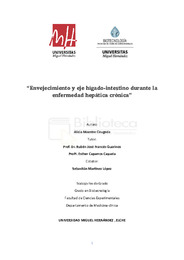Please use this identifier to cite or link to this item:
https://hdl.handle.net/11000/33169Full metadata record
| DC Field | Value | Language |
|---|---|---|
| dc.contributor.advisor | Francés, Rubén | - |
| dc.contributor.advisor | Caparros Cayuela, Esther | - |
| dc.contributor.advisor | Martínez López, Sebastián | - |
| dc.contributor.author | Maestre Cirugeda, Alicia | - |
| dc.contributor.other | Departamentos de la UMH::Medicina Clínica | es_ES |
| dc.date.accessioned | 2024-09-17T08:58:43Z | - |
| dc.date.available | 2024-09-17T08:58:43Z | - |
| dc.date.created | 2024-06 | - |
| dc.identifier.uri | https://hdl.handle.net/11000/33169 | - |
| dc.description.abstract | La cirrosis es la etapa final de la enfermedad hepática ocasionada por distintos factores que dañan al hígado. Cuando se genera una lesión hepática se desencadena una respuesta inflamatoria mediada por citocinas para combatir el daño, sin embargo, esta inflamación puede ser persistente y causar necrosis celular. En consecuencia, el hígado activa las células hepáticas estrelladas que producen proteínas de matriz extracelular. Sin embargo, a medida que se genera mayor tejido cicatricial del que se degrada, la estructura hepática se ve alterada, en un proceso denominado fibrogénesis. La fibrosis altera el flujo sanguíneo normal lo que conduce, junto con la inflamación, a la cirrosis. Otro factor relevante es el eje hígado-intestino, que se ve afectado por alteraciones en la microbiota intestinal, la permeabilidad del intestino y la hipertensión portal, además de por la propia patología hepática que favorece la pérdida de la integridad intestinal aumentando así la traslocación bacteriana en el intestino lo que exacerba la inflamación crónica en este órgano. Uno de los mecanismos moleculares de comunicación hígado-intestino es el sistema FXR que controla la síntesis de ácidos biliares y cuyo funcionamiento se ve alterado durante la cirrosis. En este trabajo de fin de grado se ha explorado el papel del envejecimiento en el eje hígado-intestino en un modelo de cirrosis hepática por CCl4 oral. Además, se ha comprobado que la cirrosis incipiente genera daños a nivel intestinal junto con alteraciones del sistema FXR. | es_ES |
| dc.description.abstract | Cirrhosis is the final stage of hepatic disease caused by several factors that damage the liver. When the liver is damaged, an inflammatory response is triggered by cytokines to combat the insult. However, if this inflammation persists it can cause cell necrosis. Consequently, the liver activates hepatic stellate cells in order to produce extracellular matrix proteins. Nevertheless, as in chronic diseases more scar tissue is generated than is degraded, the liver structure is altered, in a process known as fibrosis. Fibrosis disrupts normal blood flow leading, along with inflammation, to cirrhosis. Another relevant factor in hepatic disease is the gut-liver axis, which is affected by alterations in gut microbiota, gut permeability and portal hypertension, as well as by hepatic pathology itself, which favour the loss of intestinal integrity and, in turns, contribute to an increase in bacterial translocation in the intestine, which aggravates chronic inflammation in this organ. One of the molecular mechanisms of communication between the two organs is the FXR system which controls the synthesis of bile acids and whose functioning is impaired during cirrhosis. In this study we have explored the role of aging in the gut-liver axis during cirrhosis in a model of chronic liver disease by oral administration of CCl4. We have seen that the age is an aggravating factor for liver disease progression and that incipient cirrhosis causes intestinal damage along with alterations in FXR system. | es_ES |
| dc.format | application/pdf | es_ES |
| dc.format.extent | 40 | es_ES |
| dc.language.iso | spa | es_ES |
| dc.publisher | Universidad Miguel Hernández de Elche | es_ES |
| dc.rights | info:eu-repo/semantics/openAccess | es_ES |
| dc.rights.uri | http://creativecommons.org/licenses/by-nc-nd/4.0/ | * |
| dc.subject | Cirrosis | es_ES |
| dc.subject | envejecimiento | es_ES |
| dc.subject | inflamación | es_ES |
| dc.subject | fibrosis | es_ES |
| dc.subject | eje hígado-intestino | es_ES |
| dc.subject | permeabilidad intestinal | es_ES |
| dc.subject.other | CDU::6 - Ciencias aplicadas::61 - Medicina::616 - Patología. Medicina clínica. Oncología | es_ES |
| dc.title | Envejecimiento y eje hígado-intestino durante la enfermedad hepática crónica | es_ES |
| dc.type | info:eu-repo/semantics/bachelorThesis | es_ES |

View/Open:
TFG MaestreCirugedaAlicia.pdf
1,61 MB
Adobe PDF
Share:
.png)
